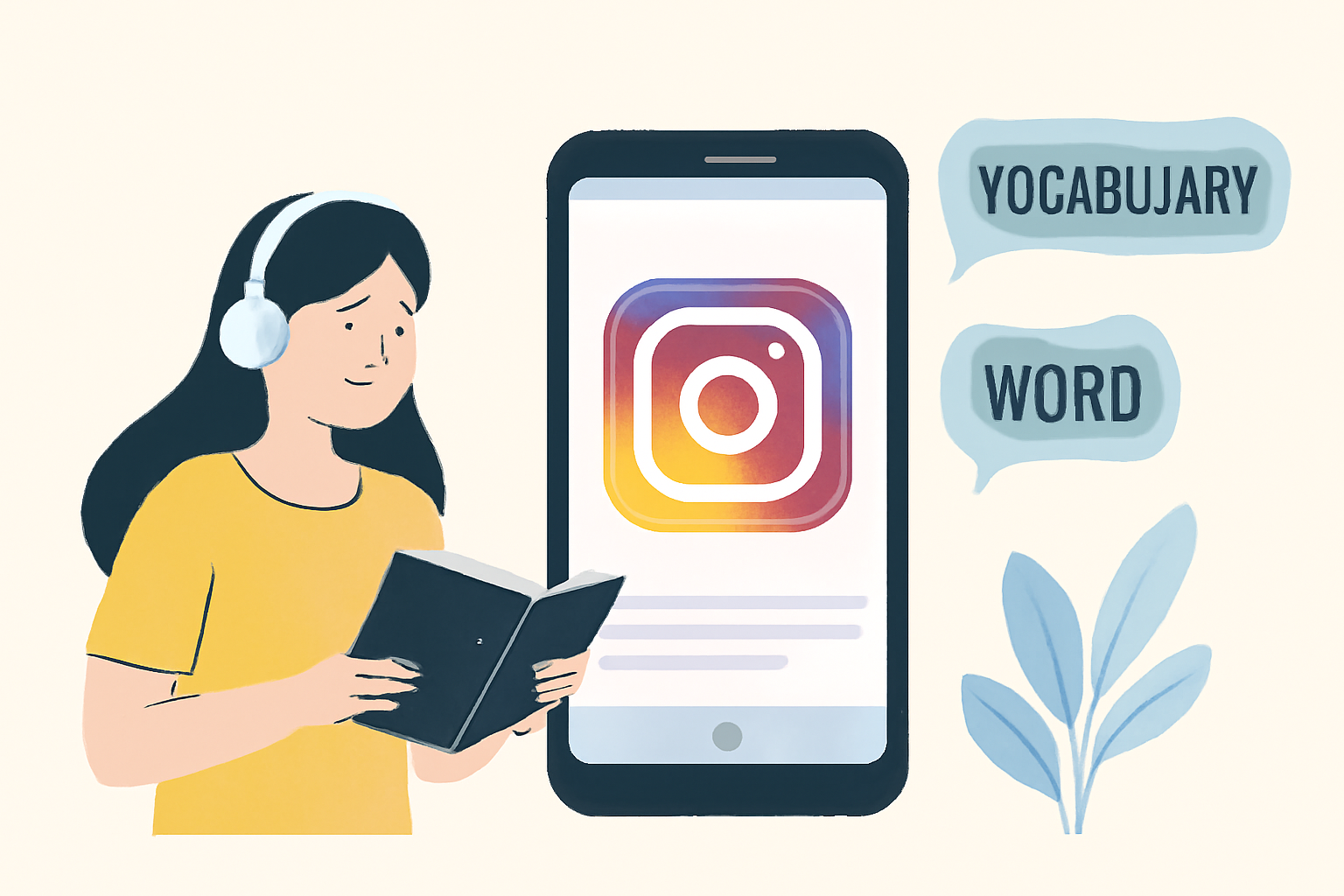Students’ Perception of using Instagram to Vocabulary Mastery in University Muhammadiyah Kalimantan Timur
DOI:
https://doi.org/10.24903/bej.v7i2.2098Keywords:
Digital Learning Tools, English Language Learning, Instagram, Social Media in Education, Vocabulary MasteryAbstract
The integration of social media into education in the contemporary digital era has created novel avenues for engaging students in language acquisition. This research delivers to look at the usage of Instagram as a supplement to promote vocabulary mastery among students at a University Muhammadiyah Kalimantan Timur. Although vocabulary is important in language competency, traditional techniques may fail to engage kids. Instagram, which is frequently used by teenagers for visual communication, gives an opportunity for contextual and interactive vocabulary development. This qualitative descriptive study will involve watching classroom activities and conducting semi-structured interviews to investigate students' involvement, reactions, and vocabulary growth using Instagram-based tasks. The study intends to evaluate the efficacy of Instagram in enhancing vocabulary acquisition, investigate its implementation in the classroom, and comprehend students'perspectives of its utility as an educational resource.
References
Agustin, S., Hafidloh, N., Damayanti, L. P., & Abadi, T. W. (2024). Transforming Teen Communication Through the Visual Influence of Social Media. Indonesian Journal of Cultural and Community Development, 15(3). https://doi.org/10.21070/ijccd.v15i3.1078
Al-Ali, S. (2014). Embracing the Selfie Craze: Exploring the Possible Use of Instagram as a Language mLearning Tool. In Issues and Trends in Educational Technology (Vol. 2, Issue 2).
Aminah, S., Nur, D. R., & Ariyanti, A. (2019). An Analysis of Teacher Talk used by English Teacher at SMKN 5 Samarinda. Borneo Educational Journal (Borju), 1(1), 22–28. https://doi.org/10.24903/bej.v1i1.256
Arbain, A., & Nur, D. R. (2017). Techniques for teaching speaking skill in Widya Gama Mahakam University. Script Journal: Journal of Linguistics and English Teaching, 2(1), 13–25. https://doi.org/10.24903/sj.v2i1.80
Arbain, A., & Rohman, A. (2023). Dubbing as a Pedagogical Tool: An Experimental Study on Eleventh-Grade Students at SMAN 8 Samarinda. EDUCASIA: Jurnal Pendidikan, Pengajaran, Dan Pembelajaran, 8(2), 147–156. https://doi.org/10.21462/educasia.v8i2.155
Arbain, A., Taufik, A., & Nur, D. R. (2017). Daily English Phrases Book. UWGM Press.
Auly, A. N., Budiman, T. C. S., & Hawa, F. (2021). the Effectiveness of Instagram Filter To Improve Students’ Vocabulary. Journal of English Language Learning, 5(2), 132–141. https://doi.org/10.31949/jell.v5i2.3469
Darman Pangaribuan, Mhd. Azan Junanda Cahya Hartono, Varhan Kudadiri, Febry Priayi Irjul Prakasa, & Jonris Tampubolon. (2025). The Integration of Social Media in Developing English Vocabulary Skills and Its Impact on Students Learning Motivation. EduInovasi: Journal of Basic Educational Studies, 5(1), 736–754. https://doi.org/10.47467/edu.v5i1.7264
Dull, E., & Reinhardt, S. P. (2014). An analytic approach for discovery. In CEUR Workshop Proceedings (Vol. 1304, pp. 89–92).
Erliana, U., & Arbain, A. (2020). The Effectiveness of Using Video Clip in Teaching English Vocabulary at SD Fastabiqul Khairat Samarinda. IJOTL-TL: Indonesian Journal of Language Teaching and Linguistics, 5(2), 123–134. https://doi.org/10.30957/ijoltl.v5i2.623
Fauziah, N., Pebriano, N. A., & Murtiningsih, T. (2023). Analysis of Vocabulary Learning Process from Instagram and TikTok. Jurnal Penelitian Ilmu-Ilmu Sosial, 4(1), 66–75. https://doi.org/10.23917/sosial.v4i1.2367
Gracella, J., & Rahman Nur, D. (2020). Students’ Perception of English Learning through YouTube Application. Borneo Educational Journal (Borju), 2(1), 20–35. https://doi.org/10.24903/bej.v2i1.623
Gonulal, T. (2019). The Use of Instagram as a Mobile-Assisted Language Learning Tool. Contemporary Educational Technology, 10(3), 309–323. https://doi.org/10.30935/cet.590108
Jiang, S., & Zhao, H. (2025). Learning english vocabulary via Instagram or YouTube: Surveying the impacts on motivation, growth mindfulness, willingness to communicate, and enjoyment from the lens of self-determination theory. Learning and Motivation, 89, 102089. https://doi.org/10.1016/j.lmot.2024.102089
Kalyuga, S. (2021). The Expertise Reversal Principle in Multimedia Learning. In The Cambridge Handbook of Multimedia Learning (pp. 171–182). Cambridge University Press. https://doi.org/10.1017/9781108894333.017
Márquez, I., Lanzeni, D., & Masanet, M. J. (2023). Teenagers as curators: digitally mediated curation of the self on Instagram. Journal of Youth Studies, 26(7), 907–924. https://doi.org/10.1080/13676261.2022.2053670
Muhammad Syafi’i, Paidi Gusmuliana, & Rahma Ramadhani. (2024). Students’ Perception of the Use of Instagram as Mobile Learning in EFL Classroom. Journal of English Education and Teaching, 8(2), 429–450. https://doi.org/10.33369/jeet.8.2.429-450
Nur, D. R. (2020). Virtual Reality adoption in Indonesia higher Education from lecturer’s voice. English Teaching Journal: A Journal of English Literature, Language and Education, 8(1), 31–35. https://doi.org/10.25273/etj.v8i1.6672
Nur, D. R., & Jamilah, J. (2022). English Language Imperative Level in Indonesia. Intensive Journal, 5(1), 36–43. http://dx.doi.org/10.31602/intensive.v5i1.5986
Nurlaily, N. (2021). Students’ Perceptions: Enhancing Vocabulary Mastery Through Vocabulary Cards Bank Project on Instagram. PROJECT (Professional Journal of English Education), 4(Vol 4, No 5 (2021): VOLUME 4 NUMBER 5, SEPTEMBER 2021), 814–821. https://doi.org/https://doi.org/10.22460/PROJECT.V4I5.P814-821
Prastyo, Y. D., Zulkarnaen, Z., & Farhana, S. (2022). THE EFFECT OF USING INSTAGRAM CAPTION ON STUDENTS’ VOCABULARY MASTERY AT TWELFTH GRADE OF SMA AL-AZHAR 3 BANDAR LAMPUNG. Journal of English Educational Study (JEES), 5(2), 122–131. https://doi.org/10.31932/jees.v5i2.1600
Verawati, V., Yanto, E. and Fitriyana, W. (2021). Students’ Perception in Instagram-Assisted Vocabulary Learning with Vocabulary Self Collection Strategy. International Journal of Education, Information Technology, and Others. https://doi.org/https://doi.org/10.5281/zenodo.5202908
Wahyudin, A. Y., Pustika, R., Widiawitasari, M., & Simamora, B. (2021). VOCABULARY LEARNING STRATEGIES OF EFL STUDENTS AT TERTIARY LEVEL. The Journal of English Literacy Education, 8(2), 101–112.

Downloads
Published
How to Cite
Issue
Section
License
Copyright (c) 2025 Danung Cipta Wardana, Dzul Rachman, Ibrahim

This work is licensed under a Creative Commons Attribution 4.0 International License.
Authors retain copyright and grant the journal right of first publication with the work simultaneously licensed under a Creative Commons Attribution 4.0 International License that allows others to share the work with an acknowledgment of the work's authorship and initial publication in this journal.



